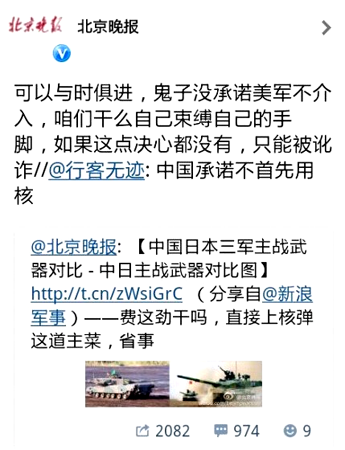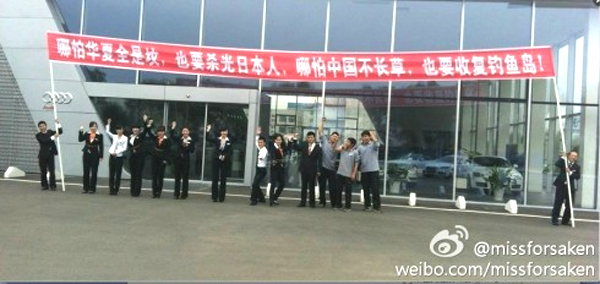The economic crisis in Europe and elsewhere deepens, political systems are unable to respond, conditions are rapidly spiraling out of control.
In English, this remark from the Chinese social networking site, Weibo:
beijingwanbao: We can adapt as times change. If the foreign devils haven’t said the U.S. army won’t get involved, what are we doing tying up our own hands and feet? If we don’t even have this measure of resolve, we’ll just be blackmailed. //@tracelesstraveler: China affirms it would not use nuclear weapons first. //@beijingwanbao: “Starting a Sino-Japanese War: Comparing Weaponry in Pictures” http://t.cn/zWsiGrC (via @milnews) Why waste energy? Skip to the main course and drop an atomic bomb. Simple.Reposts: 2082 Comments: 974
Beijing Wanbao is a Chinese capital city news broadcaster. The frenzy is about the purchase of the Senkaku Islands, by the Japanese government from their private owners last week. These uninhabited islands are located near Formosa.
Around 1900, Japanese entrepreneur Koga Tatsushirō constructed a bonito processing plant on the islands with 200 workers. The business failed in 1940 and the islands have remained deserted ever since.
Back then, nobody cared …
The islands came under US government occupation in 1945 after the surrender of Japan ended World War II. In 1969, the United Nations Economic Commission for Asia and the Far East (ECAFE) identified potential oil and gas reserves in the vicinity of the Senkaku Islands.
The xenophobic, paranoid hyper-nationalism of the Chinese is never far from the surface, the smallest scratch brings it to the surface:
More Weibo: the sign says, “Even if China becomes nothing but tombstones, we must exterminate the Japanese; even if we have to destroy our own country, we must take back the Diaoyu Islands.”
Kill humans so that there might be cars!
It’s not just about the oil, it’s about the denial about the oil: the banner is posted in front of an Audi automobile dealership by employees. Without the presumed gusher of fuel from Diaoyu-Senkaku Islands, cars are a hard-sell. The Chinese fanatics defend both their pocketbook interests and their new-found adoration of the sports sedan. The Chinese are late to the party and they know it: the furious desperation with which they grasp their last, best chance is indicative. They will have their wasteful moment in the sun and they will blow up anything and everything that stands in their way.
Like Americans, the Chinese have bet the rent money on endless supremacy of the automobile over all other things into the far distant future. Cognitive dissonance: what the banner holders don’t grasp is their cars devour the fuel supply that they themselves are willing to kill and die for. Each Chinese dies twice, once to gain oil concessions then again when their pet cars burn up the fuel supply. At the end of the day, the Chinese have nothing to show for their human sacrifices other than some used cars … and massive debts that cannot be repaid.
All of this and violent anti-Japanese riots on top of threats by the Chinese establishment to bankrupt Japan by dumping its collection of Japanese IOU’s on the market at once.
Clearly the American Way loses something in the translation to Chinese. Cars cease being ‘fun’ when they become instrumental to mass destruction.
China’s fury is misdirected: the Japanese are flat broke, depending upon the Bank of Japan to keep the debt collectors at bay for one more day (Ambrose Evans-Pritchard):
The Bank of Japan is to buy a further 10 trillion yen (US$130bn) of bonds, bringing the total accumulated so far in its battle against deflation to 80 trillion yen, or 20pc of Japanese GDP.Jun Azumi, Japan’s finance minister, praised the bank’s “bold” efforts to hold down the yen, lending credence to suspicions that the real motive is to counter “beggar-thy-neighbour” currency devaluations by other powers and prevent the strong yen choking Japan’s export industry.
Yunosuke Ikeda, from Nomura, said the Bank of Japan had yielded to “immense political pressure” after months of criticism.
Japan seeks to protect its own precious automobile industry, the central bank jumps on the quantitative easing bandwagon in an attempt to keep the status quo intact. The fact of mass, coordinated QE speaks for itself. Meanwhile, the crisis in Europe takes a political turn (Ambrose Evans-Pritchard):
Spain risks break-up as Mariano Rajoy stirs Catalan fury.
The ruling parties of Catalonia have sought guidance from Brussels on the legality of secession from Spain, requesting a “route map” for membership of the European Union and the euro as an independent state.
Jose-Manuel Garcia-Margallo, the (Spanish) foreign minister, threw down the gauntlet, calling Catalan secession “illegal and lethal”. He warned that Spain would use its veto to stop the region of Catalonia becoming an EU member “indefinitely”.
Catalan leader Artur Mas held high-stakes talks with Mr Rajoy in Madrid on Thursday, armed with a mandate from the Catalan parliament and with charged emotions left from an unprecedented protest by 1.5m people in Barcelona 10 days ago.
He demanded an independent treasury for the rich Catalan region, with control over its own tax base akin to the model already enjoyed by Basques. The 9m Catalans have an economy the size of Austria’s.
[ … ]
A serving army officer, Colonel Francisco Alaman, has fueled the flames by comparing the crisis with 1936 – when Gen Francisco Franco seized power – and by vowing to crush Catalan nationalists, described as “vultures”.
“Independence for Catalunya? Over my dead body. Spain is not Yugoslavia or Belgium. Even if the lion is sleeping, don’t provoke the lion, because he will show the ferocity proven over centuries,” he said.
Retired Lt-Gen Pedro Pitarch, a former army chief, said the words reflect “deeply-rooted thinking in large parts of the armed forces”. He also accused Madrid of bungling the Catalan drama disastrously.
“Are we looking at a failed state?” he asked. Investors holding Spanish debt are listening carefully.
There are disputes, violence and disturbances relating to oil and other resources in the Arctic, in northern, eastern, southern and western Africa, out and out war in the Middle East, in the Eastern Mediterranean littoral, the Persian Gulf in both Iran and Bahrain, in South Asia, as well as political gridlock in Europe, Japan and the United States. Every day the world steps closer to the precipice. As the economic tools prove to be useless to stem decline what remains are military tools, the means to simply steal from others. The imperial West has resorted to these tools already, to kill all of us so that (presumably) all of us might drive.
All of the above is more Peak Oil denial, like the ‘Central Bank Printing Money’ meme. The gist of the militarist argument is that stealing resources is a permanent solution to resource constraints, that the resources are available to steal, that they will be better employed by the thief.
China, Japan, Spain and the rest are bankrupted by their unaffordable automobiles. None of these countries can pay for their past consumption of non-renewable resources. They have borrowed in the past and seek to borrow now, to pay for the resources and to retire older debts.
Meanwhile, the same countries have nothing worthwhile to offer as payment for the resources they need tomorrow … or for the generations to come. They consume the means with which to pay. They offer up comic-book drek … of a careless future the outlines of which are becoming more clear. In the place of a fanciful futurama of robot kitchens and flying cars, there is a continual unraveling accompanied by denial of the same unraveling, a collective inability to respond appropriately leading to system breakdown: more cognitive dissonance.
Reality about energy supplies begins to emerge and it’s as ugly for ‘Autoworld’ as Thanksgiving is for turkeys. Peak Oil has blitzed the Greek economy into the dumpster with stunning dispatch, so much so it seems beyond the ability of sensible Greeks to understand what happened to them. Greece isn’t a hedge fund or an over-leveraged investment bank peddling fubar MBS out of a back room but a modern, middle-class nation with a (semi)functioning government and a four-thousand year history: all that except for the history is gone … in a heartbeat. Fall asleep in Greece, wake up in Angola.
— from ‘God, Peak Oil and Turkeys’ (March, 2012)
Nobody will admit that Greece was undone by peak oil, nobody will even discuss it or entertain the possibility! This isn’t economists in 2004 missing a prediction about what might happen in 2008. This is an entire army of exceptionally well-paid, over-educated analysts, policy makers, business leaders, economists, university professors, pundits, finance- and energy bloggers, fiction writers, poets and bass fishermen not seeing what is taking place right under their noses!
Now it is Spain’s turn to be swept off the table by its automobile waste. The only issue is how long will the process take. Using Greece as a model, once the establishment is admittedly insolvent, the spasm of national ruin and follow-on decline is almost instantaneous.
Like Greeks, the Spanish bet the rent on the American Way waste-based consumer economy, not realizing it was a scam. Now that they ‘know’ (or are dimly aware) there is nothing they can do about it, there is nothing the Spanish want to do about it. Like the Greeks the Spanish want the euro, they want the cars they want the modernity and will continue to do so even when the Spanish economy completely collapses. The Spanish have spent centuries living off the soil in small villages and they have no desire to return.
Same with the Chinese and Japanese.
“There’s a lot of momentum embedded in the passion of Chinese here to adopt higher-standard of living … they want their apartment, they want their cars, they want their air conditioning.
These countries’ chances to turn aside from faddish consumerism came and went decades ago. They caught themselves in the self-reinforcing web of fashion … that requires chic Spaniards/Greeks/Japanese/Chinese to have a shiny new cars, luxury jobs, designer ‘accessories’, new houses in the suburbs and ‘resorts’. Add the predatory lenders and ruthless manufacturers, shills and gamblers and the moderns were doomed. They had no idea what it was they were signing their futures away for, they believed the salesmen rather than following common sense.
All of this overhead structure is precariously balanced upon slender resources. The amounts of oil near the Senkaku Islands look to be very small. Information from the International Energy Agency (IEA, 2008)
| Field | Estimated Oil Reserves (Mbbl) |
| Canxue | 5 |
| Baoyunting | 4.5 |
| Chunxiao | 3.8< |
| Cuanqaio | 2.2 |
| Wuyunting | 1.9 |
| Tianwaitin | .5 |
| Total: | 17.9 |
Twenty million barrels is an insignificant amount of oil to go to war over. Presumably there is more than the 20 million … that can be retrieved by improved drilling. Yet, even 2 billion- or 20 billion barrels of proven reserves would do little to address the 10 million barrel per day consumption habits of the Japanese and Chinese. A decade and more of extraction enterprise is required to bring any oil to the markets. In the meantime, the world’s other oil wells relentlessly decline. Bloated demand outruns all possible sources of new supply. The only question is how long will it be until this demand is bankrupted?
Next goes Europe, itself. The Greek default closes the book on Europe in its current form, which is a lost cause. It is the end of the beginning: there is not going to be any ‘recovery’ or way back from the abyss that is now engulfing the continent. Some fragments here and there might save themselves for a little while, then like sparks from a bonfire be swept away by the wind. The crisis must now burn itself out: Europeans, look to yourselves and may your turkey-God have mercy on your souls.
Not much longer, children ….

